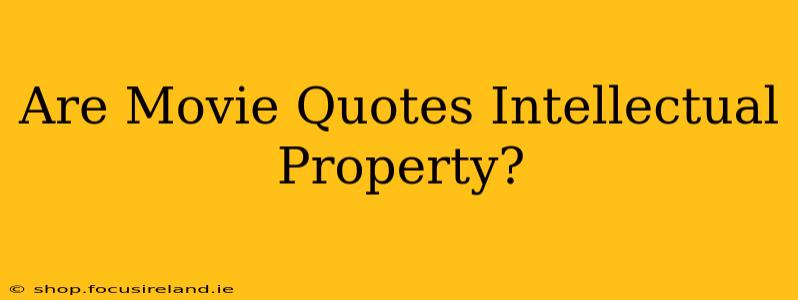Movie quotes. We all know them, love them, and often use them in everyday conversation. But are those catchy lines from our favorite films actually protected by intellectual property laws? The short answer is: it's complicated. While the movie itself is certainly protected by copyright, the legal status of individual quotes is a nuanced area dependent on several factors. Let's explore this further.
What is Intellectual Property?
Before diving into movie quotes, let's clarify what intellectual property (IP) is. IP refers to creations of the mind, such as inventions; literary and artistic works; designs; and symbols, names, and images used in commerce. Copyright is a type of IP protection that grants the creator of an original work exclusive rights to reproduce, distribute, display, and adapt their work. This typically applies to the entire movie script, not just individual lines.
Do Copyright Laws Protect Movie Quotes?
The copyright protection afforded to a movie extends to the entire script – the sum of its parts, including dialogue. However, simply quoting a line doesn't automatically infringe on this copyright. The key lies in the concept of fair use.
What is Fair Use?
Fair use is a legal doctrine that permits limited use of copyrighted material without acquiring permission from the rights holders. It's a defense against copyright infringement, not an exception. Determining whether a use is "fair" involves considering four factors:
- The purpose and character of the use: Is it for commercial or non-profit educational purposes? Transformative uses (adding new meaning or message) are more likely to be considered fair use.
- The nature of the copyrighted work: Is it published or unpublished? Factual works are generally more likely to be subject to fair use than fictional works.
- The amount and substantiality of the portion used: Using a small portion is generally more likely to be considered fair use than using a large portion.
- The effect of the use upon the potential market for or value of the copyrighted work: Does the use harm the market for the original work?
In the context of movie quotes, using a single line or a few lines in a review, parody, or academic paper is more likely to qualify as fair use than using numerous quotes extensively in a commercial product.
Can I Use Movie Quotes Commercially?
Using movie quotes for commercial purposes, such as in advertising or merchandising, is a much higher-risk activity. Unless you obtain permission from the copyright holder (typically the studio that owns the film's rights), your use could be considered copyright infringement. This is because commercial use typically fails the "purpose and character" and "effect on the market" tests of fair use.
What About Short Quotes in Social Media Posts?
Using short movie quotes on social media falls into a gray area. While the likelihood of legal action is low for casual use, it's still technically unauthorized reproduction of copyrighted material. The risk increases with the frequency and context of the quotes' use.
Are there any exceptions to copyright on movie quotes?
There are no specific exceptions for movie quotes, only the broader framework of fair use. The threshold of acceptable use hinges on factors like context, transformation, and impact on the original work's market value.
What happens if I infringe on a movie quote copyright?
The consequences of infringing on copyright can range from a cease-and-desist letter to significant financial penalties, depending on the extent of the infringement and the copyright holder's response.
In conclusion, while the underlying script of a movie enjoys full copyright protection, the use of individual quotes depends heavily on context and the principles of fair use. Commercial ventures should always seek permission. For personal use, exercise caution and discretion. Remember, understanding fair use is crucial, but it’s always advisable to err on the side of caution, especially for commercial use.

